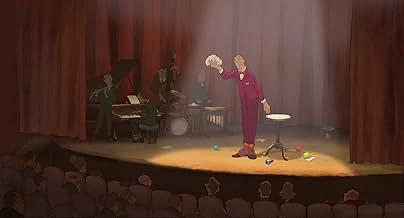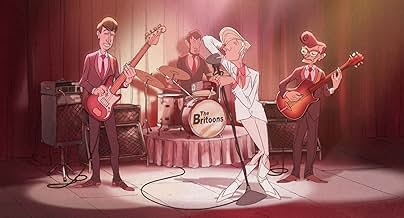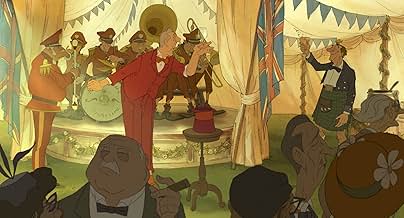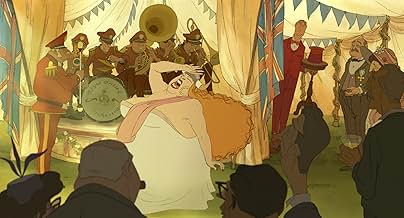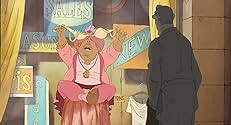L'illusionniste
- 2010
- Tous publics
- 1h 20m
IMDb RATING
7.4/10
37K
YOUR RATING
A French illusionist finds himself out of work and travels to Scotland, where he meets a young woman. Their ensuing adventure changes both their lives forever.A French illusionist finds himself out of work and travels to Scotland, where he meets a young woman. Their ensuing adventure changes both their lives forever.A French illusionist finds himself out of work and travels to Scotland, where he meets a young woman. Their ensuing adventure changes both their lives forever.
- Director
- Writers
- Stars
- Nominated for 1 Oscar
- 7 wins & 35 nominations total
Jean-Claude Donda
- The Illusionist
- (voice)
- …
Eilidh Rankin
- Alice
- (voice)
Tom Urie
- Additional Voices
- (voice)
Paul Bandey
- Additional Voices
- (voice)
Jacques Tati
- Monsieur Hulot
- (archive footage)
- (uncredited)
- Director
- Writers
- All cast & crew
- Production, box office & more at IMDbPro
Featured reviews
Sylvain Choment's latest film adapts a script by Jacques Tati. The film's unique style is only being shown in forty cinemas across the UK, its box office status falling behind the animated Pixar hit Toy Story 3.
Those who are followers of Tati's work or loved Belleville Rendez-vous will inevitably be drawn to such as personal piece. As will those seeking out a different experience from Disney, Pixar and even Studio Ghibli animation. This film, however, may confuse or bore those who are looking for the usual Hollywood narrative. It is a shame the detail of this touching story will be overlooked by so many. KH
Those who are followers of Tati's work or loved Belleville Rendez-vous will inevitably be drawn to such as personal piece. As will those seeking out a different experience from Disney, Pixar and even Studio Ghibli animation. This film, however, may confuse or bore those who are looking for the usual Hollywood narrative. It is a shame the detail of this touching story will be overlooked by so many. KH
All my scepticism was futile, thank God! This animated charmer really oozes Tati's peculiar brand of character comedy from every single pore.
Yes, the story is more sentimental and streamlined than the master's original efforts, but Tati's central issues (such as old-fashioned life-styles and values confronted by modern technology), his eye for detail, his pleasantly reserved humanity and his wonderful sense for comedic timing and subtle gags are all left intact by the careful makers of this gem. And the rendering of the Hulot character with all his distinctive mannerisms is a joy to behold.
Plus, it's good to see beautiful hand-drawn animation for a change (with sparse use of CGI techniques.)
8 out of 10 querulous white rabbits
Yes, the story is more sentimental and streamlined than the master's original efforts, but Tati's central issues (such as old-fashioned life-styles and values confronted by modern technology), his eye for detail, his pleasantly reserved humanity and his wonderful sense for comedic timing and subtle gags are all left intact by the careful makers of this gem. And the rendering of the Hulot character with all his distinctive mannerisms is a joy to behold.
Plus, it's good to see beautiful hand-drawn animation for a change (with sparse use of CGI techniques.)
8 out of 10 querulous white rabbits
10zetes
Sylvain Chomet's long-awaited follow-up to The Triplets of Belleville adapts an unfilmed screenplay by French master Jacques Tati. Chomet's film doesn't feel much like a Tati film, though - it's very much a Chomet film. But that's okay. I wouldn't want some poor director to feel he has to ape another filmmaker's style. The Illusionist follows a vaudeville magician, modelled after Tati (and called Tatischeff, which was Tati's real last name). He's old, and his world is starting to fade. He leaves France for an extended tour of Britain. Eventually he finds his way to a remote Scottish island, where he meets up with a young woman, Alice. When Tatischeff leaves the island, the girl coyly follows him, and he pretty much adopts her. The two go to Edinburgh (or a fictionalized, Edinburgh-like city) and Tatischeff gets a regular job at a theater (and another at a gas station, secretly, at night) so he can provide the girl with the beautiful clothes she desires (having existed in squalor on the island, she has never seen dresses as beautiful as she does in the city).
The biggest resemblance that it bears to Tati's films, besides the Tati caricature at its center, is the fleeting, impossible romance between the man and the girl. All four of the M. Hulot films contain this element to one degree or another. In The Illusionist, the relationship falls somewhere between the analogous romances in M. Hulot's Holiday and Mon Oncle. In Mon Oncle, there is a teenage girl who has a crush on M. Hulot, but he knows he's far too old for her and treats her in an avuncular fashion. In M. Hulot's Holiday, he is quite a bit older than the blonde, who is frequently bothered by boys her own age, but at least he has a chance. In The Illusionist, Tatischeff is an old man. He does love the girl. He can keep her, but can never have her. She essentially isn't any different than his rabbit - living its life in a cage. When it's free, it's only going to bite his finger when he gets too close.
The film does not contain much in the way of the grotesque oddities that fueled The Triplets of Belleville. It is much subtler, gentler, and more beautiful. It has a grace all its own. It can be very funny when it wishes. Chomet has obviously spent years on this film, and it looks spectacular. Even if he had made only The Triplets of Belleville, his reputation amongst cinematic animators would be secure, but The Illusionist puts him very near the top of the list of the greatest who ever lived.
The biggest resemblance that it bears to Tati's films, besides the Tati caricature at its center, is the fleeting, impossible romance between the man and the girl. All four of the M. Hulot films contain this element to one degree or another. In The Illusionist, the relationship falls somewhere between the analogous romances in M. Hulot's Holiday and Mon Oncle. In Mon Oncle, there is a teenage girl who has a crush on M. Hulot, but he knows he's far too old for her and treats her in an avuncular fashion. In M. Hulot's Holiday, he is quite a bit older than the blonde, who is frequently bothered by boys her own age, but at least he has a chance. In The Illusionist, Tatischeff is an old man. He does love the girl. He can keep her, but can never have her. She essentially isn't any different than his rabbit - living its life in a cage. When it's free, it's only going to bite his finger when he gets too close.
The film does not contain much in the way of the grotesque oddities that fueled The Triplets of Belleville. It is much subtler, gentler, and more beautiful. It has a grace all its own. It can be very funny when it wishes. Chomet has obviously spent years on this film, and it looks spectacular. Even if he had made only The Triplets of Belleville, his reputation amongst cinematic animators would be secure, but The Illusionist puts him very near the top of the list of the greatest who ever lived.
When I went to go see this film at the Edinburgh Film Festival there was a big buzz surrounding it. People were enthralled that a movie would focus so much on the city, but did it do Edinburgh justice?
A few minutes into the movie Edinburgh comes into picture. Set in the 1950's we see a quiet and very quaint Edinburgh. It features heavily on many of the monuments still present today and I love the way we see the architecture unaffected by modern builds. It made me wish I lived back then. The 3D shot that encapsulates all of Edinburgh in one go, is mind-blowing.
However, as much as I loved seeing Edinburgh in the wonderful rich colours of detail, I was disappointed by the rather gloomy feel to the movie. Yes, it has its charming moments, especially with the merry, drunk Scotsman character, but much of the side plots and main plots I feel are a tad melancholy which in turn, sobered my experience of the film.
The little dialogue (mainly in French and Gaelic; I don't understand either) is pretty easy to follow, but during the end of the film I was left cold when I misunderstood small phrases. It did frustrate me a little, but it led me to interpret the film differently, giving an ambiguous feel to an overall very charming and impressive piece of animation.
A few minutes into the movie Edinburgh comes into picture. Set in the 1950's we see a quiet and very quaint Edinburgh. It features heavily on many of the monuments still present today and I love the way we see the architecture unaffected by modern builds. It made me wish I lived back then. The 3D shot that encapsulates all of Edinburgh in one go, is mind-blowing.
However, as much as I loved seeing Edinburgh in the wonderful rich colours of detail, I was disappointed by the rather gloomy feel to the movie. Yes, it has its charming moments, especially with the merry, drunk Scotsman character, but much of the side plots and main plots I feel are a tad melancholy which in turn, sobered my experience of the film.
The little dialogue (mainly in French and Gaelic; I don't understand either) is pretty easy to follow, but during the end of the film I was left cold when I misunderstood small phrases. It did frustrate me a little, but it led me to interpret the film differently, giving an ambiguous feel to an overall very charming and impressive piece of animation.
This is a French-British animated cartoon adapted from a script by Jacques Tati with a vaudeville magician main character who looks and moves very much like Tati. Like Tati's films, it is basically a silent, with a few miscellaneous lines and mumblings here and there. It's a very pleasant if wistfully melancholy look at the dying era of live music hall entertainment, set in 1959. The action starts in Paris, and as our protagonist goes on tour it moves to London and then Scotland, where it remains for the rest of the picture. There he meets a young hotel maid who latches onto him like a father figure and the pair try to survive on what he can earn.
It's a nice little film that should have gotten more recognition (it was nominated for the Best Animated Feature Oscar) but the fact that it's a cartoon but essentially a drama (despite frequent droll Tati-style humor) was likely too confusing for mainstream cineplex audiences to wrap their heads around. Tati fans will appreciate the bit where the guy walks into a movie theatre playing MON ONCLE.
It's a nice little film that should have gotten more recognition (it was nominated for the Best Animated Feature Oscar) but the fact that it's a cartoon but essentially a drama (despite frequent droll Tati-style humor) was likely too confusing for mainstream cineplex audiences to wrap their heads around. Tati fans will appreciate the bit where the guy walks into a movie theatre playing MON ONCLE.
Did you know
- TriviaWhen the Illusionist is performing at the Scottish pub, one of the patrons in the foreground, near the middle of the frame, is the famous "Young Girl and Old Woman" optical illusion.
- GoofsDespite being set in 1959/1960, the Scottish Police motorcycles have 'American-style' sirens, which were not introduced until the 1980s.
- Crazy creditsAt the end of the final credits, there's a short bonus scene.
- SoundtracksMy Girl Blue
Written & Composed by Malcolm Ross
Published by Django Films Ltd
Performed by Malcolm Ross, Iain Stoddart (as Ian Stoddart), and Leo Condie aka - "The Britoons"
- How long is The Illusionist?Powered by Alexa
Details
- Release date
- Countries of origin
- Official site
- Languages
- Also known as
- The Illusionist
- Filming locations
- Edinburgh, Scotland, UK(Studio)
- Production companies
- See more company credits at IMDbPro
Box office
- Budget
- $17,000,000 (estimated)
- Gross US & Canada
- $2,231,474
- Opening weekend US & Canada
- $38,594
- Dec 26, 2010
- Gross worldwide
- $6,007,194
- Runtime
- 1h 20m(80 min)
- Color
- Sound mix
- Aspect ratio
- 1.85 : 1
Contribute to this page
Suggest an edit or add missing content







